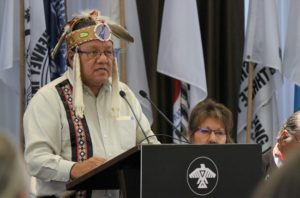‘We’re 26 First Nations strong,’ says Anishinabek Nation Grand Council Chief as self-government vote nears

By Cindy Males
LONDON— Anishinabek First Nation citizens have an important decision ahead of them when they vote on a self-government agreement with Canada this coming February. With a little less than three months to go before the vote, Anishinabek Nation Grand Council Chief Glen Hare is encouraging citizens to vote ‘yes’.
The vote on the proposed Anishinabek Nation Governance Agreement is scheduled for February 1 to 29, 2020, for First Nations that have authorized a vote through Band Council Resolution (BCR). Last week, when Grand Council Chief Hare addressed the Anishinabek Nation Chiefs-in-Assembly in London, more than half of the 40 Anishinabek First Nations had authorized a vote on the proposed Governance Agreement.
“We’re 26 First Nations strong on this Agreement, and there are meetings happening as we speak yet in our communities.”
Since then, two more First Nations have signaled their intention to run a vote on the proposed Governance Agreement, bringing the total to 28 First Nations.
Once the proposed Anishinabek Nation Governance Agreement is ratified, the Government of Canada will formally recognize Anishinabek First Nation law-making power and authority over how their First Nations are governed. The four parts of the Indian Act that deal with governance will no longer apply to the Anishinabek First Nations who ratify the proposed Agreement. The First Nations will make their own decisions and laws about leadership selection, citizenship (E’Dbendaagzijig) government operations, as well as how best to protect and promote Anishinaabe language and culture.
Anishinabek Nation staff are now preparing to help the First Nations who ratify the Governance Agreement transition from Indian Act governance.
“We have a plan, it’s called a Transition Plan, and it’s for the 13-month window after the vote,” says Fred Bellefeuille, Anishinabek Nation Legal Counsel. “It’s about developing the four template laws, making sure that the culture is integrated. We don’t have to do everything overnight. We have high expectations of ourselves, but it doesn’t all have to be done really quickly. We have to transition things.”
The draft Transition Plan includes First Nation representative working groups for the four law-making areas, the development of fiscal transfer arrangements and financial authorities, an implementation committee, and the development of a registry and repository of laws.
Of the Anishinabek First Nations who agreed to run a vote on the Governance Agreement, 20 are already in a self-government agreement with Canada and Ontario, respectively, for Anishinabek education. Part of the Transition Plan includes the coordination of the Anishinabek Nation Education and Governance Agreements.
Work is also underway on a Long-Term Strategic Plan for the Anishinabek Nation that will set out realistic and measurable targets to improve the quality of life for all citizens and leaders. The plan will build off the proposed Anishinabek Nation Governance Agreement and support strategic leadership to close the socio-economic gaps between First Nations and the rest of Canada and to facilitate prosperity.
Consultants with BDO Canada are meeting with Anishinabek First Nations and collecting input.
“We’ve been talking about social development. We’ve been talking about health. We’ve been talking about education, economic development, internal governance, external governance,” says Derek Rice, BDO National Lead, Economic Development. “And we’ve been collecting some very detailed information about directions from all of the different communities that we’ve been meeting with.”
“It’s not like we’re starting right from scratch,” adds Grand Council Chief Hare. “We’ve got a lot of kids, smart kids that are holding jobs just like everybody else in this country. We’re ready to go.”
For more information on the proposed Anishinabek Nation Governance Agreement, please visit: governancevote.ca.


